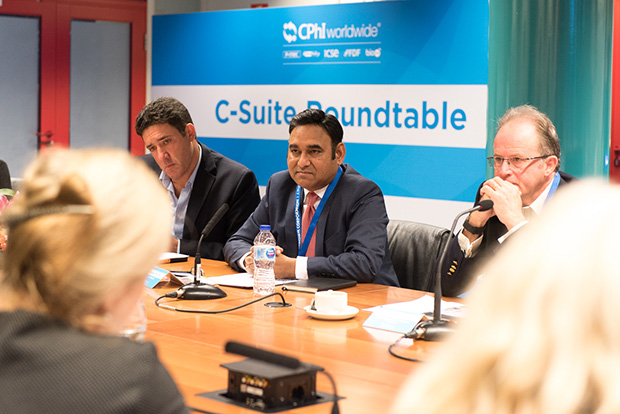On Tuesday morning, a group of the pharmaceutical industry’s global leaders met in an unprecedented closed-door session in Madrid at CPhI Worldwide, the world’s leading pharmaceutical exhibition.
Simon Frost
Sharon Todd and Dr Tae Han Kim, CEO, Samsung Biologics. Image: CPHI
Organised in partnership with SCI, the inaugural C-Suite Roundtable event gathered CEOs, COOs, Managing Directors and other executive leaders from across the pharmaceutical sector worldwide for a top-level discussion of challenges, opportunities, and strategies.
SCI’s Executive Director, Sharon Todd, moderated this pivotal meeting, structuring the discussion around three overarching themes affecting industry today and in the future. The themes were centred around accelerating innovation and R&D, the future shape of industry, and the key underpins to ensuring success in the future – effective regulation and improving the public perception of the sector.
Ms Todd invited the industry leaders to summarise their interpretation of challenges and opportunities across these broad themes – a starting point from which a lively discussion quickly unfolded.
The group agreed that there were significant opportunities in innovation; not only in product development, but also in process development, marketing and new delivery mechanisms and devices.
One CEO urged the industry to take bolder steps to create new routes to medicines and embrace new technologies to enable this. An industry shift away from historically conservative processes and modes of working was a topic that several attendees highlighted throughout the meeting, and collaboration in R&D was seen as critical in enabling and accelerating innovations into industry.
‘There’s never been a better time in last 100 years for emerging technologies and breakthroughs’, said another executive, citing developments in genomics, combinatorial therapies, precision medicine, biotech, AI, and process technologies.
The constant evolution of the sector was discussed at length, and the group was able to bring different perspectives, operating at different parts of the supply chain. The continuing rise of mini-pharma companies offering increasingly potent therapies in more niche areas, the proliferation of companies in the supply chain, and the changing business models precipitated by technological developments were all discussed.
The potential for significant new entrants, possibly technology providers, to take a prominent position in the sector was mooted. Such a move would create a real challenge to established business models, but one CEO argued that such a move would bring various learnings, new ideas and supply chain capabilities. One pharma CEO praised them for ‘rocking the boat’, unencumbered by the industry’s traditional structures.
Paul Thorning, Vivek Sharma and Ian Shott. Image: CPHI
The difficult topic of public perception of the industry generated strong reaction. The importance of the industry communicating its value to the consumer was highlighted, and it was felt that more needed to be done in this area. The innovation, investment and commitment of many companies to finding accessible and affordable solutions was not often recognised.
In this respect, tech companies were held up as examples of how innovative companies can turn themselves into ‘heroes’ for the consumer, creating real value. Learning from companies who are able to precipitate and accelerate the rate of innovation by promoting collaboration and allowing others to innovate from their platforms (for example, allowing third parties licenses to develop apps for smartphones) was proposed as a potential model for the future. One attendee compared the public perception of these industries and the perceived (and commercial) value of their products – in the arena of public opinion, smartphones have been valued more highly than lifesaving medicines.
‘License out, and you can bring value back in,’ one CEO noted, adding that the pharmaceutical industry could gain greater public trust by opening its big data tools to allow wider collaboration and, like the smartphone industry, reduce its manufacturing and development costs through smarter outsourcing and incremental innovations, free from the financial risk that has traditionally slowed lab-to-market.
A theme that emerged as a unifier in a changing industry was a shift towards more patient-oriented visions and missions being laid out at the top level. One executive said ‘As a whole industry, we have to integrate what we do at the interface with the patient, whether that is improved processes or quality of treatment. We have to demonstrate value to the patient.’
The pharmaceutical industry is changing shape, and as new areas such as biotech and novel industry networks streamline the processes of research, development, manufacture and regulation, it will be patients who, ultimately, see the most benefit.
A full writeup of this discussion will be published in SCI’s members’ magazine, C&I, and will be publicly available to non-members for a limited period on soci.org.
Present at the meeting were:
Sharon Todd, Executive Director, SCI
Vivek Sharma, CEO, Piramal
Dr Giovanni Papandrea, CEO of Chematek
Ricardo Libori, Commercial Director, Chematek
Dr Clemens Troche, CEO – betapharm & Head – Europe Generics, Dr. Reddy's Laboratories
Marie-Liesse Le Corfec, Global Marketing Head, BD Medical
Dr Tae Han Kim, CEO, Samsung Biologics
Ian Shott, CEO & Executive Chairman, Arcinova
Lynne Byers, Executive Director, NSF International
Jonathan Arnold, President Oral Drug Delivery, Catalent Pharma Solutions GmbH
Paul Thorning, CEO, Crystec Pharma

